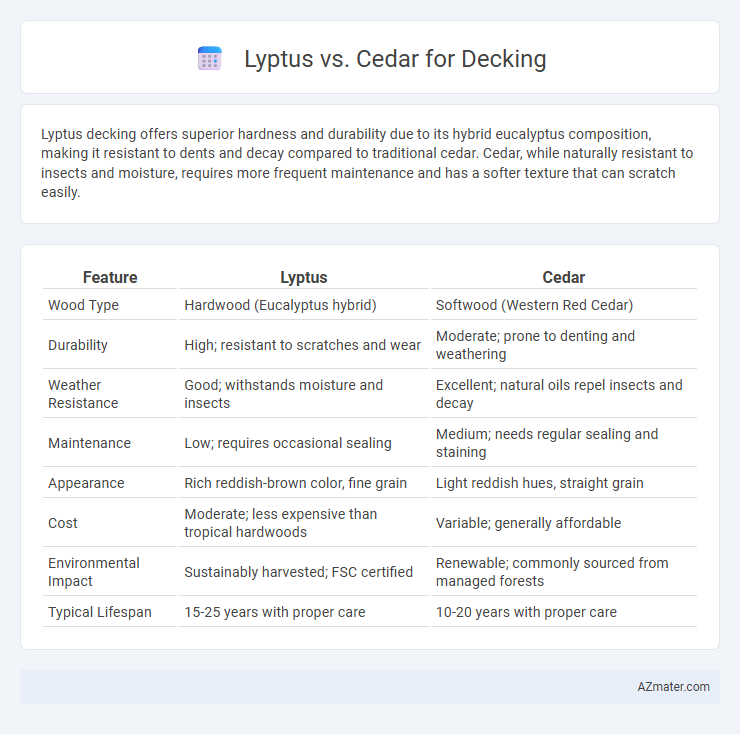Lyptus decking offers superior hardness and durability due to its hybrid eucalyptus composition, making it resistant to dents and decay compared to traditional cedar. Cedar, while naturally resistant to insects and moisture, requires more frequent maintenance and has a softer texture that can scratch easily.
Table of Comparison
| Feature | Lyptus | Cedar |
|---|---|---|
| Wood Type | Hardwood (Eucalyptus hybrid) | Softwood (Western Red Cedar) |
| Durability | High; resistant to scratches and wear | Moderate; prone to denting and weathering |
| Weather Resistance | Good; withstands moisture and insects | Excellent; natural oils repel insects and decay |
| Maintenance | Low; requires occasional sealing | Medium; needs regular sealing and staining |
| Appearance | Rich reddish-brown color, fine grain | Light reddish hues, straight grain |
| Cost | Moderate; less expensive than tropical hardwoods | Variable; generally affordable |
| Environmental Impact | Sustainably harvested; FSC certified | Renewable; commonly sourced from managed forests |
| Typical Lifespan | 15-25 years with proper care | 10-20 years with proper care |
Introduction to Lyptus and Cedar Decking
Lyptus decking is crafted from a hybrid Eucalyptus species known for its rapid growth and sustainable harvesting, offering a dense, hard surface with rich, reddish tones. Cedar decking, derived primarily from Western Red Cedar, is prized for its natural resistance to decay and insect damage, alongside a warm, aromatic wood grain that ages to a silvery gray. Both Lyptus and Cedar provide durable, attractive options for outdoor decking, with Lyptus favored for its hardness and sustainability, and Cedar valued for its natural beauty and weather resistance.
Sustainability and Environmental Impact
Lyptus wood, derived from fast-growing eucalyptus hybrids, offers a sustainable decking option due to its rapid renewability and certified forestry practices that minimize environmental degradation. Cedar, although naturally resistant to decay and pests, grows slower and often involves more extensive harvesting, impacting forest ecosystems over time. Choosing Lyptus reduces carbon footprints through efficient growth cycles and responsible sourcing, making it an eco-friendlier alternative for sustainable decking projects.
Durability and Lifespan Comparison
Lyptus offers a hardwood decking option with durability comparable to traditional hardwoods, featuring resistance to warping, rot, and insect damage, making it suitable for outdoor applications. Cedar provides natural oils that enhance its resistance to decay and insects, but it is softer and may require more maintenance compared to Lyptus. In terms of lifespan, Lyptus decking can last 15-30 years with proper care, while cedar typically endures 10-20 years before showing significant wear.
Resistance to Weather, Rot, and Insects
Lyptus offers superior resistance to weather, rot, and insect damage due to its dense hardwood composition and natural oils, making it ideal for outdoor decking. Cedar also provides good resistance to decay and insects, especially Western Red Cedar, thanks to its natural preservatives, but it is generally softer and may require more maintenance over time. Both woods perform well in outdoor conditions, but Lyptus tends to be more durable and stable under harsh weather exposure.
Appearance and Color Variations
Lyptus decking showcases a consistent reddish-brown hue with minimal color variation, offering a sleek and uniform appearance ideal for modern outdoor spaces. Cedar decking presents a broader palette, ranging from light amber to deeper reddish tones, creating a natural, rustic charm with pronounced grain patterns. Both woods develop a silvery patina over time, but cedar's color diversity makes it a preferred choice for varied, textured aesthetics.
Maintenance and Care Requirements
Lyptus decking demands less maintenance due to its high density and natural resistance to decay and insects, requiring only occasional cleaning and sealing for optimal longevity. Cedar, while naturally resistant to rot and insect damage, necessitates more frequent upkeep, including regular staining or sealing to prevent weathering and maintain its appearance. Both woods benefit from periodic cleaning, but Lyptus provides a more durable, low-maintenance option for decking applications.
Cost and Budget Considerations
Lyptus decking tends to be more affordable than cedar, offering a cost-effective option for budget-conscious homeowners without sacrificing durability. Cedar decking, while typically pricier, provides natural resistance to decay and insect damage, potentially lowering long-term maintenance expenses. Factoring in initial purchase price and ongoing upkeep, Lyptus presents a competitive choice for those seeking quality decking within a tighter budget.
Installation Process and Ease
Lyptus decking offers a smooth surface and uniform density, making it easier to cut and shape during installation compared to cedar. Cedar wood is naturally softer and more pliable, which can simplify nailing but may require extra care to prevent splitting and surface damage. Both materials accommodate standard decking tools well, but Lyptus's consistent hardness reduces the risk of installation errors and ensures longer-lasting fastener retention.
Availability and Sourcing
Lyptus decking is widely available through specialized hardwood suppliers due to its sustainable plantation origins in Brazil, ensuring consistent and eco-friendly sourcing. Cedar, sourced mainly from the Pacific Northwest forests, is more common in North American markets, with its availability subject to regional logging regulations and seasonal harvests. Both materials offer reliable sourcing options, but Lyptus often benefits from controlled plantation growth, while cedar availability can fluctuate based on environmental policies and natural forest conditions.
Pros and Cons: Lyptus vs Cedar Decking
Lyptus decking offers high durability and resistance to decay, with a dense hardwood composition that provides long-lasting strength and a smooth finish, but it can be pricier and harder to source compared to cedar. Cedar decking is naturally resistant to insects and moisture, boasting a warm aesthetic with a soft texture that is easier to work with, though it requires more frequent maintenance and is less durable in high-traffic areas. Choosing between Lyptus and Cedar depends on budget, desired maintenance level, and the specific environmental conditions of your decking project.

Infographic: Lyptus vs Cedar for Decking
 azmater.com
azmater.com